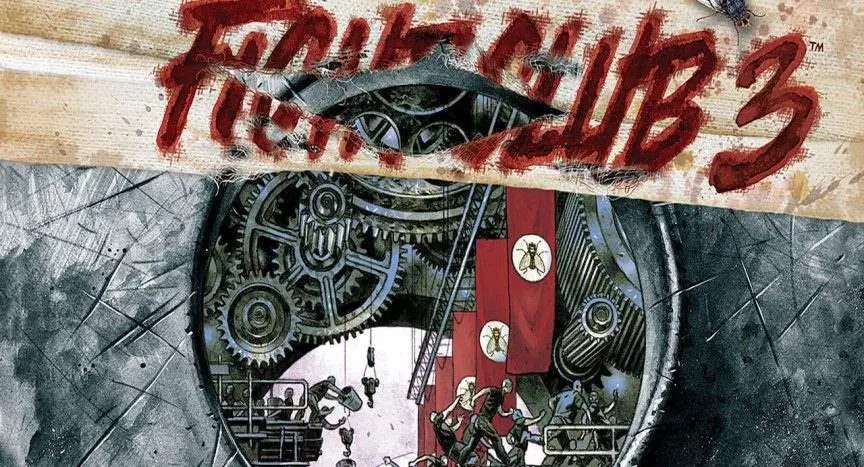Three years after the conclusion of Chuck Palahniuk’s unexpected sequel, Fight Club 2, Tyler Durden is still the only constant. Following a climax as meta as it was jarring, Fight Club 3 anchors itself in the musing of a follow-up proposed by the Palahniuk-within-the-comic before he’s abruptly offed by Durden. Past the wreckage of a nuclear holocaust that never happened, the implications of Tyler’s global takeover through Ryze or Die are not seen at part three’s onset beyond a nonchalant newspaper headline. Marla is several months pregnant, Sebastian is job-hunting under the name Balthazar, and their son is seemingly unscathed by Tyler’s influence. On the flipside, of a split narrative, an unnamed woman paints her dead dog, Entourage, within an unassuming frame of unprecedented power.
Such was the case with the previous installment, Fight Club 3 generates its resonance through quick glimpses of Sebastian (Balthazar) and Marla’s life with a stream-of-consciousness fluidity. The comic is reminiscent of David Mazzucchelli’s Asterios Polyp with a bit more confidence in its presentation. In fact, at times it feels, at least for the first issue, Palahniuk’s influence is a bit removed. Rather, Cameron Stewart and McCaig’s hybridized style breathe and subsequently sprint towards the chaos which will transpire.
Related: See our reviews of more Palahniuk offerings from Dark Horse
If Fight Club 2 was any indication, Palahniuk is a master of subverting expectation without sabotaging what makes his texts so compelling. So much so, in fact, he notably implemented the influence of his own enthusiasts into part two’s climax. Fight Club 3, however, feels a bit less involved. Not out of lethargy, but more so consideration and familiarity with the medium. Though there may have been some doubt as to why a comic should carry the legacy of the series, Fight Club 3’s first issue argues there is no other option.
Most notably, however, is Fight Club’s shift in focus from global implications and cataclysm to personal introspection through the psychological toll of Tyler Durden. Rather than orchestrate a widespread hostage situation across the world superpowers, he instead seeks to disassemble the protagonist at his core. Perhaps since the original novel, Tyler feels less like Mr. Hyde-esque mastermind and more of the physical embodiment of every sinister intention. The latter, frankly, feels far more harrowing. While Sebastian was a vessel, Balthazar is brimming with the influence of Tyler, as grotesquely and perfectly illustrated in the first issue’s final panel. With a few key moments and a heightened trust in the reader, Fight Club 3 sets itself up to be the series’ most personal examination.
Fight Club 3, Issue One is on shelves now.
Wicked Rating: 9/10.






